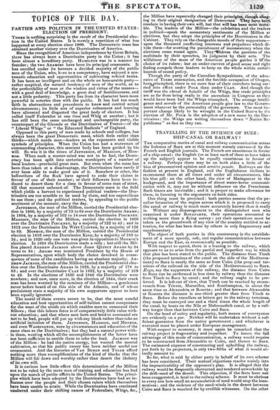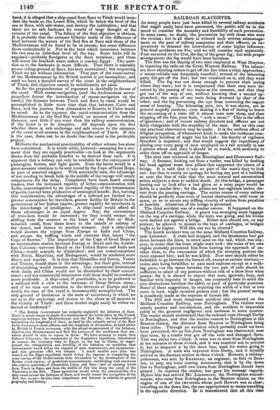TRAVELLING BY THE ISTHMUS OF SUEZ: SHIP-CANAL OR RAILWAY?
THE comparative merits of canal and railway communication across the Isthmus of Suez are at this moment warmly canvassed by the
French and English journals. The French are unanimous in favour of a ship-canal ; the English (or at least such of them as have taken up the subject) appear to be equally unanimous in favour of a railway. Perhaps there may be on both sides a little of the bias of preconceived opinion and arriire pewee. Railways are the
fashion at present in England, and the Englishman inclines to recommend them at all times and under all circumstances, like his blue pill : on the other hand, the view of Madagascar in the background, and the importance of direct water-borne communi- cation with it, may not be without influence on the Frenchman. Such biases are inevitable ; and it is proper to make allowance for them, in listening to the arguments on both sides.
One thing must be premised : both parties assume that the pe- culiar formation of the region across which it is proposed to carry the canal or railway is much more accurately known than it really is. Without any disparagement to the distinguished men who examined it under BONAPARTE, their operations amounted to
nothing more than a flying survey : yet their operations must be taken as the groundwork of any view of the country entitled to at- tention, for what has been done by others is only fragmentary and supplementary. The object of both parties in this controversy is the establish- ment of a more speedy, safe, and regular communication between Europe and the East, as economically as possible.
With respect to speed, there is a leaning to the railway, which appears to us to arise from the partial and imperfect way in which that plan has been stated to the public. The distance from Tineh (the proposed terminus of the canal on the side of the Mediterra- nean) to Suez is nearly the same as from Cairo (the proposed ter- minus of the railroad on the side of the Mediterranean) to Suez.
Ergo, say the supporters of the railway, the distance from Cairo to Suez can be performed in less time by railway than the distance
from Tineh to Suez by canal ; and the railway ought to be pre- ferred. It is left out of view, that Tineh can be reached by steam- vessels from Trieste, Marseilles, and Southampton, in about the same time as Alexandria or Rosetta; and that between Alexandria or Rosetta the distance is one-third greater than from Tineh to Suez. Before the travellers or letters get to the railway terminus they must be conveyed one and a third times the whole length of the canal, by boats on the Nile or Mahmoudieh canal, or by a rail- way longer than that between Cairo and Suez. On the head of safety and regularity, both means of conveyance are evidently on a par. Neither will be undertaken without a suf- ficient guarantee from the native government ; and whichever is executed must be placed under European management.
With respect to economy, it must again be remarked that the railway project is fragmentary and imperfect. To insure the full
advantage of this mode of communication, a railway would require to be constructed from Alexandria to Cairo, and thence to Suez. The estimated expense of constructing and upholding the railway, put forth by its projectors, is only two-fifths of what it would ac- tually amount to.
So far, what is said by either party in behalf of its own scheme has been considered. Their mutual objections resolve mainly into
the impracticability of the opponent's plan. It is alleged that the railway would be frequently obstructed and rendered unworkable by the drift-sand of the desert. This objection, if the facts have not been exaggerated, is fatal to the railway scheme. It must be obvious to every one how small an accumulation of sand would stop the loco- motives ; and the violence of the sand-winds in the desert between Cairo and Suez is vouched for by credible witnesses. On the other hand, it is alleged that a ship-canal from Suez to Tineh would inun- date the lands on the Lower Nile, which lie below the level of the sea at Suez, with salt-water, and destroy the cultivation ; and that there are no safe harbours for vessels of large draught at the termini of the canal. The fallacy of the first objection is obvious. It is probable that the estimate hitherto made of the difference of level between the waters of the Red Sea at Suez and those of the Mediterranean will be found to be in excess; but some difference there undoubtedly is. Nor is the land which intervenes between the two seas an unbroken level all the way. Some locks will be required—probably floodgates at the Suez terminus ; and these will arrest the brackish water before it reaches Egypt. The ques- tion as to the harbours is more difficult. That there is tolerably secure riding-ground at Suez, has been ascertained ; but respecting Tineh we are without information. That part of the coast-survey of the Mediterranean by the British marine is yet incomplete; and until we have a detailed survey of the coast in the neighbourhood of Tineh, this objection cannot be satisfactorily set aside.
So far the preponderance of argument is decidedly in favour of the canal. With steam-navigation, (and the Archimedean screw- propellers favour the introduction of steam-navigation on the canal,) the distance between Tineh and Suez by canal would be accomplished in little more time than that between Cairo and Suez, and the journey from Alexandria or Rosetta to Cairo would be saved. As to the expense, the canal-communication from the Mediterranean to the Red Sea would, on account of its inferior distance, cost little if any more than the railway communication, if the latter is to be complete. All depends upon the fact whether there is safe anchorage and safe access to the entrance of the canal at all seasons in the neighbourhood of Tineh. If this is the case, there can be no doubt that the canal is the preferable project.
Hitherto the mechanical practicability of either scheme has alone been considered. It is worth while, however—assuming for a mo- ment that they are equally practicable—to look at the arguments drawn from the probable benefits to be derived from each. It is apparent that a railway can only be available for the conveyance of passengers, letters, and light goods. Even the latter would in a great measure continue to be sent round by the Cape of Good Hope, as part of assorted cargoes. With mercantile men, the advantage of not needing to break bulk in the middle of the voyage will amply compensate for the delay. Complaints have been heard among traders, that the increased rapidity of letter-communication with India, unaccompanied by an increased rapidity of the transmission of goods, has not been productive of unmingled benefit. But, waiving this consideration, the advantages of a railroad are limited to— greater convenience for travellers, greater facility for Britain in the government of her Indian empire, greater rapidity for merchants in the interchange of intelligence. A ship-canal would afford all these advantages in an equal degree. Nay, the convenience of travellers would be increased ; for they would escape the shifting from the steamer to the boats of the Nile or Mah- moudieh canal, from these boats to the camels or railway of the desert, and thence to another steamer. And a ship-canal would shorten the voyage from Europe to India and China, and escape the baffling winds and currents that haunt "the Cape of Storms." The importance of the Cape of Good Hope as an intermediate station between Europe or Brazil and the Austra- lian Colonies—between Brazil or the United States and India and China—would scarcely be diminished ; and our communications with Natal, Mauritius, and Madagascar, would be rendered more direct and regular. It is true that Marseilles and Genoa, Venice atgl Trieste, would share in the advantage ; but their gain, instead of diminishing, would increase ours. Our commercial intercourse with India and China would not be diminished by their concur- rence; and our commercial intercourse with them would be rendered Inure profitable. A ship-canal, if practicable, is to be preferred to a railroad with a view to the interests of Great Britain alone ; and if we turn our attention to the interests of Europe and the world, the case of the canal is immeasurably strengthened. The only ground of hesitation is the state of uncertainty in which we are as to the anchorage and access to the shore at all seasons in the vicinity of Tineh: and these doubts might easily be either re- moved or confirmed.* • The British Government has culpably neglected the Isthmus of Suez. There is much reason to doubt the correctness of the levels taken by the French engineers between the Mediterranean and the Red Sea : the impossibility of reconciling the longitudes of Suez, as fixed by the valuable survey of the East India Company's naval officers, and the longitude of Alexandria, as fixed either by British or French surveyors, with the actual measurement of the Isthmus, deprives our Mediterranean and Red Sea surveys of the confidence that ma- riners 6hould be able to repose in them. We have occasion to know, that Colonel CHESNEY, the commander of the Euphrates expedition, volunteered to remain the necessary time in Egypt, on his way to China, to super- intend the triangulation and levelling of the Isthmus, on condition that Government would defray the expense of men, instruments, and equipments : and this generous offer was refused. A much smaller sum than was wasted on the Niger expedition would defray the expense of completing the coast-survey of the Mediteranean from Alexandria to the termination of the Syrian coast-survey; of geodetical measurements, establishing with exactness the relative positions of Alexandria, Cairo, and Suez ; and of running levels from Tineh to Suez, and from the middle of this line along the canal of the Ptolemies to the Nile. These operations would settle the practicability of a ship-canal across the Isthmus of Suez, and would render the navigation of the Red Sea secure—besides their importance and interest in relation to general geography and history.



























 Previous page
Previous page